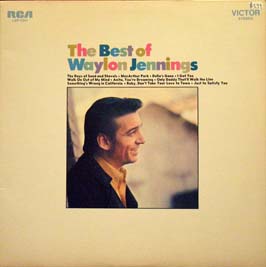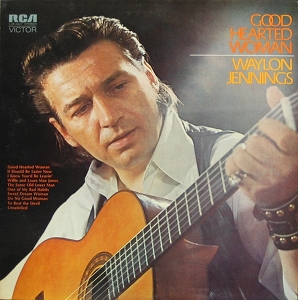Background
In his autobiography, Jennings proclaimed his fondness for the title track: "It had it all, the horn stabs that I loved so much, an insistent piano figure that lodged in your brain, and four (count 'em) key modulations upward, so the song never stopped getting you higher. The lyrics were especially meaningful, for a poor country boy who had worked his way up from 'a dream you could cling to' to a spot in the working world of country music." In his 2013 book Outlaws: Waylon, Willie, Kris, and the Renegades of Nashville, author Michael Streissguth insists, "After two years of emulating Jim Reeves and Marty Robbins, not to mention the likes of Buck Owens and George Jones, Waylon finally showed signs of asserting his own style on 1967's album Love of the Common People, which boldly featured Mel Tillis' 'Ruby Don't Take Your Love to Town,' a rare commentary on the personal toll of war, and Lennon and McCartney's 'You've Got to Hide Your Love Away.'" Jennings had also recorded The Beatles' "Norwegian Wood (This Bird Has Flown)" on his previous LP Nashville Rebel .
The reissue of the album (on Buddha/RCA) features two bonus tracks, including the Harlan Howard song "The Chokin' Kind, which rose to #8 for Jennings in 1968.

Waylon Arnold Jennings was an American singer, songwriter, musician, and actor. He is considered one of the pioneers of the outlaw movement in country music.
Harlan Perry Howard was an American songwriter, principally in country music. In a career spanning six decades, Howard wrote many popular and enduring songs, recorded by a variety of different artists.

Waylon Sings Ol' Harlan is a 1967 album by American country music artist Waylon Jennings, released on RCA Victor. It consists completely of songs by Harlan Howard.

Folk-Country is the major-label debut album by American country music artist Waylon Jennings, released in 1966 on RCA Victor. It is his first collaboration with producer Chet Atkins.

Nashville Rebel is the third studio album by American country music artist Waylon Jennings, released in December 1966 via RCA Victor. It reached #4 on the Billboard country albums chart.

The One and Only is a studio album by American country music artist Waylon Jennings, released in 1967 on RCA Camden. It peaked at #19 on the Billboard country albums chart.

Hangin' On is a studio album by American country music artist Waylon Jennings, released in 1968 on RCA Victor.

Jewels is a studio album by American country music singer and songwriter Waylon Jennings, released in 1968 on RCA Victor.

The Best of Waylon Jennings is a compilation album by American country music artist Waylon Jennings, released in 1970 on RCA Nashville.

Good Hearted Woman is a studio album by American country music artist Waylon Jennings, released in 1972 on RCA Nashville.

Lonesome, On'ry and Mean is a studio album by American country music artist Waylon Jennings, released on RCA Victor in 1973. It was, after Good Hearted Woman and Ladies Love Outlaws, the third in a series of albums which were to establish Jennings as one of the most prominent representatives of the outlaw country movement. Photographer Mick Rock shot the album's cover.

Wanted! The Outlaws is a compilation album by Waylon Jennings, Willie Nelson, Jessi Colter, and Tompall Glaser, released by RCA Records in 1976. The album consists of previously released material with four new songs. Released to capitalize on the new outlaw country movement, Wanted! The Outlaws earned its place in music history by becoming the first country album to be platinum-certified, reaching sales of one million.

Waylon & Willie is a duet studio album by American singers Waylon Jennings and Willie Nelson, released by RCA Records in 1978. In the US, it stayed at #1 album on the country album charts for ten weeks and would spend a total of 126 weeks on the country charts.

Waylon Live is a live album by Waylon Jennings, released on RCA Victor in 1976.

Nashville Rebel is a box set by Waylon Jennings, released on RCA Nashville through Legacy Recordings in 2006. According to AllMusic's Stephen Thomas Erlewine, it is "the first comprehensive, multi-label Waylon Jennings retrospective ever assembled," comprising ninety-two songs recorded between [1958 and 1994, with selections from the majority of the singer's recording career. The first track of the box set is the Buddy Holly-produced "Jole Blon," released in 1958, while the last is "I Do Believe," a song produced by Don Was that was included on The Highwaymen's 1995 release, The Road Goes On Forever. The other material on the box set covers Jennings' career chronologically, with songs ranging from his years on RCA's roster to later compositions from his short-lived stay at Epic Records; it ignores, however, the tracks from Jennings albums released on independent labels. The majority of the singer's charting singles are included in the package, as are collaborations such as "Mamas Don't Let Your Babies Grow Up to Be Cowboys" with Willie Nelson and "Highwayman" with The Highwaymen. A notable addition is the previously unreleased "The Greatest Cowboy of Them All," a 1978 duet with Johnny Cash which was later recorded by Cash alone for A Believer Sings the Truth (1979) and The Mystery of Life (1991); two others, "It's Sure Been Fun" and "People in Dallas Got Hair," had never been released in the United States. Nashville Rebel was released on four CDs, with a 140-page booklet and liner notes by Rich Kienzle and Lenny Kaye.

The Words Don't Fit the Picture is the 14th studio album by country singer Willie Nelson.

Country Music Concert is a 1966 live album by country singer Willie Nelson.
"The Chokin' Kind" is a 1967 song written by Nashville songwriter Harlan Howard. Country music artist Waylon Jennings recorded the original version and released it as a single in 1967. It peaked at number eight on the US Hot Country Singles chart. Jennings featured the track on his 1967 album Hangin' On. R&B artist Joe Simon covered the song in 1969, earning a Grammy Award.

A Country Star Is Born is the debut studio album by American country music artist, Jessi Colter. The album was released April 1970 off of RCA Victor, and was produced by Chet Atkins and Waylon Jennings.

Ralph Eugene Mooney was an American steel guitar player and songwriter, he was inducted into the Steel Guitar Hall of Fame in 1983. He was the original steel guitarist in Merle Haggard's band, The Strangers and Waylon Jennings's band, The Waylors.


















